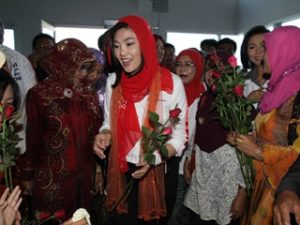 It’s beginning to look a lot like Christmas for Pheu Thai leaders. As the campaigns for both major parties ratchet up in anticipation of the July 3rd vote, Yingluck Shinawatra, Pheu Thai’s very likely candidate for the premiership and sister to ousted ex-Prime Minister Thaksin Shinawatra, received a huge boost after stumping in Yala province yesterday.
It’s beginning to look a lot like Christmas for Pheu Thai leaders. As the campaigns for both major parties ratchet up in anticipation of the July 3rd vote, Yingluck Shinawatra, Pheu Thai’s very likely candidate for the premiership and sister to ousted ex-Prime Minister Thaksin Shinawatra, received a huge boost after stumping in Yala province yesterday.
Yala, a Muslim majority region and the southernmost province in Thailand, has traditionally been a Democrat Party stronghold. During the elections of 2005, Thaksin received the largest percentage of the popular vote in the country’s democratic history when his now defunct Thai Rak Thai party captured 375 out of a possible 500 seats in the House of Representatives. But the southern region, including Yala, was the only region in which the Democrats actually gained seats in 2005, whilst losing everywhere else. There are several reasons for this phenomenon, not least of which was Thaksin’s crackdown on Muslim dissidents and his penchant for abandoning dialogue and consultation with leaders of the Muslim community in favor of more draconian approaches to curtail the insurgency.
Islamic identity in southern Thailand has been the source of plenty of tension between Bangkok and various separatists groups in the south for several decades, intensifying in acuteness during the first decade of the 21st century. Scholars differ on whether the roots of the insurgency are religiously based or lie more within the context of the broader topic of self-identity (perhaps the topic of a future article). In any event, the fact that Yingluck was as warmly received as she was on Tuesday is emblematic of the shift in the Thai political landscape after three years under the illegitimate and undemocratic government of Prime Minister Abhisit Vejjajiva.
Showing incredible poise and political posture for someone which such a dearth of experience, Yingluck pandered to the crowd in a red hijab and elucidated her plans to give more autonomy to the southern provinces. “I want to highlight the Pheu Thai platform to transform the three southernmost provinces into a special administrative area similar to Bangkok Metropolitan Administration and Pattaya City Administration,” she said. It is a message that was warmly received, especially by Muslim women, who chanted “yamilah” which means “beautiful girl.” Yingluck would be Thailand’s first female prime minister if she is tabbed to lead Pheu Thai and if the party wins a majority in the election.